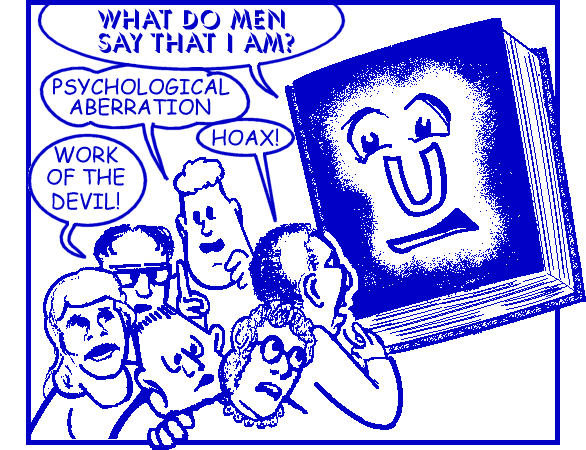Urantiana in the News
The thoughful, the addlepated, and the duplicitous

Tila Tequila

Not Tila
Tila Tequila said insane things about coming interstellar wars and conspiracy theories this week. Let’s try to interpret blares the headline in the Washington Post over a "style blog" 2013 Dec 13 submission by one Caitlin Dewey, a Washington D.C. "social media reporter" who has written for the New York Times and the Atlantic!
Tila Tequila reportedly tweeted, "Dec. 9, 4:55 p.m. Let me tell you a really quick story that will probably make zero sense to you whatsoever but here goes: So in the future there is going to be a huge war for Earth Empire between the Aeon Illuminati, The Earth Soldiers, The Supreme Seraphim, and the Cyborg Faction.”
Yes, what a mish-mash. in "interpreting" this tinfoil-hatted tweet, Caitlin Dewey writes, "'Supreme Seraphim' … are 'the highest of the seven revealed orders of local universe angels,' according to the obscure 'Urantia Book,' a sort of New Age Judeo-Christian spin-off that fervently insists it is not a cult."
![]()
Just, never mind Tila Tequila and whatever agitates her. Too many compound conspiracies conflagrating. You can judge for yourself by watching her video about exposing the Illuminati.
However, regarding this "style blogger," I have no idea what previous familiarity Caitlin Dewey has with The Urantia Book, or the various organizations and factions it has generated. Whole seconds may have been consumed searching out the phrase "Supreme Seraphim" and perhaps seconds more to scan a few sites critical of the UB. (No need to click on the links, just read the quips brought up by the search engine.)
That the Urantia revelations are still relatively "obscure," I'll readily grant you, and since I'm a go-slow person, for my taste, it could continue in relative obscurity for a good while. "New Age" is often applied to it, but it's a debatable descriptor for a book ostensibly promulgated in the 1930s and 1940s — if anything, the Papers might be considered as deriving from the spiritual revivalism of the late 19th and early 20th Centuries, but then, so would a lot of what was called "New Age"). While the UB discourses extensively on Judaism and Christianity, and does claim a direct heritage therefrom, theologically it is far more than an eclectic "spin-off."
But never mind such definitional and doctrinal trivia.
Dewey sneered that the "Urantia Book … fervently insists it is not a cult"? That's an awfully dismissive and arrogant attack upon the book and a lot of people to whom its teachings mean a lot.
Religion, science, economics, or politics, the LaughingStock Media types have their tropes and seem to believe there's no need to dig further, nor show anything but the vilest mockery of that to which they think themselves superior. It's unsurprising, then, this easy, denigrating dismissal of all those for whom the Urantia teachings are valuable, especially considering the treatment given those who respect the Bible, much less the Book of Mormon … anything but the Koran, some of whose followers might blow you up if you did.
The folks whom I first encountered in the Urantia Brotherhood of 1974 were just amazingly average, faithful people, like you'd find in many Midwestern congregations across the country. As far as that goes, I was among a a very few … um … blue-jeaned bohemians among the Sunday-best-dressed folks attending, and we few were pretty tame by freaky standards of later years.
In the subsequent forty years, the "obscure" revelation has become much less obscure. The folks who claim the teachings as their religion now include all manner of people and attitudes not so much in evidence back then. Self-styled cult leaders will "interpret" the teachings in ways I consider absurd to dangerous. One fellow precipitated an end-is-nigh episode (fortunately, despite lives ruined, it had a non-climax which was non-fatal to all participants). There are some mystical folks who believe they have "new" messages to add to the original teachings. On and on. Good ol' humanity.
 Throughout all this, stoically poised amidst the brouhaha, is the original book itself, fundamentally unchanged from the day of its original publication, just as unfathomable in its actual origins as it is fathomable (mostly) as a whole teaching. The minor (or not so minor) edits surreptitiously made following the first printed edition have been cataloged (finally). Much has been discovered about the various sources seemingly adapted for the text. Its various statements and implications have been examined in relation to history, anthropology, astronomy, chemistry, and physics. Research of all kinds into this book continues, but whatever we make out of them, the Papers are just themselves, as they've always been.
Throughout all this, stoically poised amidst the brouhaha, is the original book itself, fundamentally unchanged from the day of its original publication, just as unfathomable in its actual origins as it is fathomable (mostly) as a whole teaching. The minor (or not so minor) edits surreptitiously made following the first printed edition have been cataloged (finally). Much has been discovered about the various sources seemingly adapted for the text. Its various statements and implications have been examined in relation to history, anthropology, astronomy, chemistry, and physics. Research of all kinds into this book continues, but whatever we make out of them, the Papers are just themselves, as they've always been.
 I suppose sometimes the obvious must be belabored. The Urantia Book is a book, and not a cult! Anyone can read it for oneself, nowadays even free, online, you lucky youngsters. You don't have to buy anything or believe one single thing anybody else says about it (especially me). Nobody owns it; nobody is an authority on it (except me).
I suppose sometimes the obvious must be belabored. The Urantia Book is a book, and not a cult! Anyone can read it for oneself, nowadays even free, online, you lucky youngsters. You don't have to buy anything or believe one single thing anybody else says about it (especially me). Nobody owns it; nobody is an authority on it (except me).
People can be, well, crazy. "Urantia Bookies" are not significantly crazier than average. Any stirring message will excite its wise and foolish followers, and the more stirring the message, the broader the attraction; although both wise and foolish contingents grow, the honking foolish will be the more noticable. With its space-age perspective, lost years of Jesus, alleged celestial authorship, and origins wrapped in mystery — as well describing a complex universe of beings and worlds which readers can obsess over like Tolkien fans with the Lord of the Rings appendices — what's really remarkable is that this book had such a long, strong, solid initial "cult" of people who were mostly non-mystical, and quite reasonable (other than thinking celestials wrote their book). As far as I know, those type of people are still the mainstream, the majority, of the Urantia "movement." Those who claim to speak for the revelation have included some few on the fringe of reason and sanity, but mostly those who try to understand and live these remarkable teachings are average folk, a "cult" only in the sense of any group of people with a devoutly shared interest.
Some factions of folk who vaunt the book may be unhealthy isolationists, even dangerously perverse, just as we see with humankind in every other grouping. But there is nothing secretive, isolationist, or cult-like in the pejorative sense, about the basic Urantia Foundation (well, not anymore, there was a period of time…), nor are the main Fellowship and Brotherhood organizations which have been formed any type of church. Most of the best effort of the "movement" has simply been fostering study of the book, getting people together with others interested in study and discussion, and offering such study guides as have been developed by other readers.
It's a book to be read, to be fathomed if you take the time. That which you derive from it, which you find valuable, if anything, is to be incorporated into your personal spiritual perspective, just like truth wherever you find it. Then maybe you'll want to read with some other folks, see what they might have figured out that you missed in the course of two thousand pages. And soon, you, too, can "fervently insist you're not in a cult."
♦
Additionally, of absolutely no interest to the likes of the world's Caitlin Deweys:
Regarding Supreme Seraphim
"These seraphim are the highest of the seven revealed orders of local universe angels." (Paper 39) For those who care about the incarnation of the Creator Sons which the UB describes, it's of interest that before our local universe Son was incarnate as a mortal on our world, he was at one time a Supreme Seraphim. Supreme Seraphim are involved in the downreach of the Sons and the upreach of evolutionary creatures. Most significantly to us, perhaps, are the group called "court advisers":
The seraphic court advisers serve extensively as defenders of mortals. Not that there ever exists any disposition to be unfair to the lowly creatures of the realms, but while justice demands the adjudication of every default in the climb towards divine perfection, mercy requires that every such misstep be fairly adjudged in accordance with the creature nature and the divine purpose. These angels are the exponents and exemplification of the element of mercy inherent in divine justice — of fairness based on the knowledge of the underlying facts of personal motives and racial tendencies.


